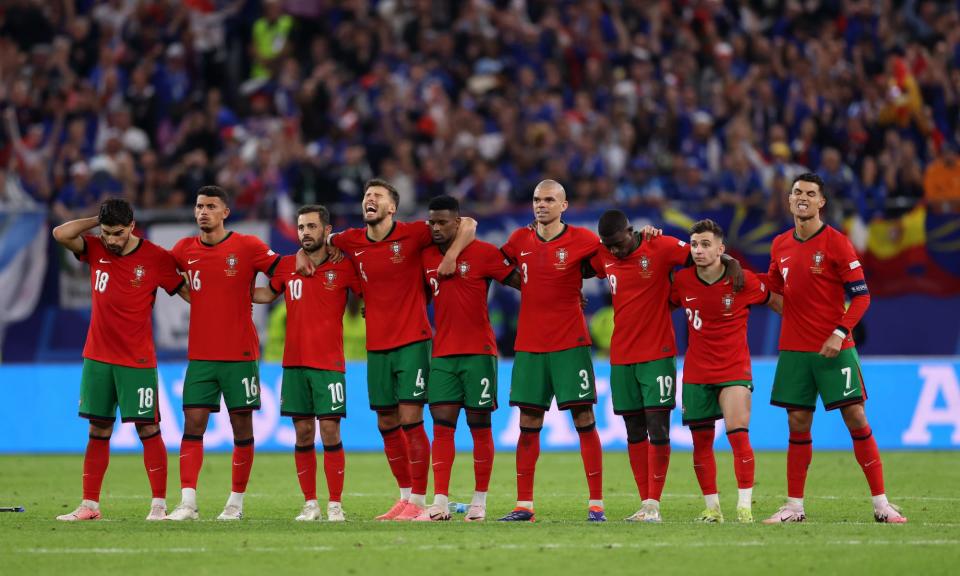Portugal v France: a galactic battle lost in the black hole of one man’s ego

Even his absence feels like a kind of presence. The cameras continue to seek him out. The fans in the stands in their replica Manchester United tops screech a little louder, scowl a little harder. The less he does, the more important he becomes. The more he disappears into this game, the heavier it feels, like a black hole sucking everything into its vortex.
And ultimately Portugal too. The sabotage is complete. One of the most talented squads ever assembled at this level of football disappears into that self same black hole, a Vegas-era Elvis act ultimately notable only for its ability to make us gawp and keep gawping. It’s too awful to watch. It’s too awful not to watch. The clock ticks into its third hour, the second quarter-final suspended like a sentence that can never end, and yet with the knowledge of exactly how it ends. Meanwhile, Gonçalo Ramos and Diogo Jota sit on the bench.
Related: Théo Hernandez hits the spot as France beat Portugal in shootout to progress
This was not a bad game of football. No game with this many spellbindingly brilliant players on the pitch can ever be truly tedious. Indeed, the talent is a kind of protagonist in its own right. It was a game that felt – for better and worse – like a final, every action and decision dancing on the cusp of instant disaster. Football with maximum context: every pass and tackle freighted with meaning and intent, every shot on goal like a death.
Some of the finishing is truly awful. Some of the defending is gladiatorial. Early in the game Randal Kolo Muani picks up the ball just outside the area and Pepe just puts him into a taxi, bundles him aside like a vengeful father. Pepe will end the game with 152 touches, more than anyone else on the pitch. Pepe will sprint stride for stride with the substitute Marcus Thuram – a man to whom he is giving 15 years and 90 minutes in the legs – and put the ball out for a corner. Pepe will block a shot from Kylian Mbappé and celebrate it like an Olympic gold medal.
Rúben Dias will make a crucial block on Kolo Muani as he goes through on goal. Nuno Mendes will slide in on Mbappé just as the great man is about to pull the trigger. At the other end Eduardo Camavinga will make a brilliant sprawling tackle on a rushing Rafael Leão, a fraction of a second before he shoots from a tight angle. William Saliba will just be quietly brilliant. This is not the stuff of highlights reels and social media gold-dust. But it is, in its own way, the very highest form of footballing heroism.
The temptation is to point at this French side, with their semi-final berth and their zero goals from open play, and to remark sardonically that Didier Deschamps has finally managed to create a team perfectly in his own image. This is, of course, unfair. Deschamps was ruthlessly selfless as a player, his every action oriented towards the collective. France, on the other hand, have the feel of a team being held together by success alone. Get enough talent in there, and maybe the teamwork takes care of itself. No wonder they finally seemed to free up when penalties arrived: a series of simple individual battles, a test of personal skill, no tactics, no complications.
And yet even Deschamps has the presence to withdraw Mbappé in the 106th minute when it becomes clear that it’s not going to be his night. He was outrun by João Cancelo, couldn’t convert any of his five shots, and if Mbappé can’t sprint and can’t shoot, then frankly all you really have left is a man in a mask pointing into spaces. He sees out the closing minutes sat on the bench, an ice pack pressed to his nose.
But at least France know how to function without their captain. Portugal, by contrast, are still wedded to theirs, the chain-wrapped anvil that will eventually bring them all down. There is little point giving him anything to chase, or playing any pass to him longer than about 20 yards. If he peels to the left wing in the 53rd minute, he won’t make it back into the centre until the 55th. He misses terribly from close range. He claims another free-kick from an impossible angle, and somehow manages to hit all three players in the wall.
In a way, it’s hard not to feel resentful of him: resentful of the way this grand, galaxy-sized occasion is ultimately reduced to a function of one man’s ego. This could have been an all-time great quarter-final, and instead a part of it was stolen: stolen ball possession, stolen attention, stolen minutes from better players who actually deserve to be there, rather than a pure anachronism trotting out simply because no one has the clout to tell him not to.
Théo Hernandez scores the winning penalty, and immediately the Portuguese players instinctively flood towards the heartbroken João Félix, the only man to miss his penalty, and gather him in their arms. Mendes runs to him. João Palhinha runs to him. Nelson Semedo runs to him. Pepe sets aside his own sadness – this may well have been his last game – and runs to him. There is still a team here, and the only sadness is that we never got to see it.
One man does not run to Félix. Instead he walks in the other direction, off on his own, pursued only by the prurient gaze of the camera. It’s Cristiano Ronaldo.

